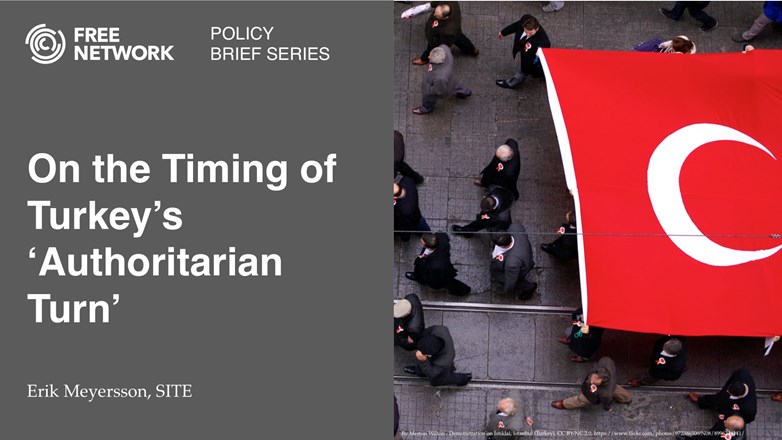On the Timing of Turkey’s Authoritarian Turn
This policy brief shows that Turkey’s authoritarian turn under the ruling AKP is not a recent phenomenon. Instead, the country’s institutional erosion – especially in terms of freedoms of expression and political pluralism – in fact began much earlier, and the losses in the earlier periods so far tend to dwarf those occurring later.
Introduction
A growing field in economics emphasizes the importance of the media in shaping economic outcomes. Whereas the role of the media in informing voters is well established (Strömberg, 2015), recent research also points to the link between the rise of illiberal democracies (Mukand and Rodrik, 2016) and authoritarian control over media (Guriev and Treisman, 2015).
In few countries is the link between authoritarianism and restrictions on freedom of expression as pervasive as in Turkey. The Turkish government under the Erdoğan-led Justice and Development Party AKP has gutted the judiciary of most of its independence, and set it loose to crack down on critical media. These dire circumstances, however, contrast markedly with descriptions of Turkey from of a few years ago. Quite recently many analysts still deemed Turkey a "vibrant democracy", and as late as in 2013 the foreign minister of Sweden proclaimed: "Erdoğan's Turkey is on the right path." This media shift raises concerns over the public portrayal of Turkey's institutional development up until the last few years as well as the extent to which analysts may have misinterpreted Turkey's institutional development over the past decade.
Measures of Freedoms
To this date, the most prominent source of measuring freedoms in the world is the Freedom House's annual Freedom of the World reports (Freedom House, 2015), which designates countries into one of three statuses: Free, Partly Free, and Not Free, in ascending order in freedoms. In constructing these statuses, FH uses subscores for 7 subcategories, aggregated into 2 categories -- Political Rights (hereby PR), with a range of 0 to 40 increasing in freedoms, and Civil Liberties (hereby CL), with a range 0 to 60 increasing in freedoms – for which each then gets its own 1-7 (with a low value indicating more freedoms and vice versa), and in turn these are used to classify a country as having a particular Freedom status. From the FH's methodology section:
A country or territory is awarded 0 to 4 points for each of 10 political rights indicators and 15 civil liberties indicators, which take the form of questions; a score of 0 represents the smallest degree of freedom and 4 the greatest degree of freedom. The political rights questions are grouped into three subcategories: Electoral Process (3 questions), Political Pluralism and Participation (4), and Functioning of Government (3). The civil liberties questions are grouped into four subcategories: Freedom of Expression and Belief (4 questions), Associational and Organizational Rights (3), Rule of Law (4), and Personal Autonomy and Individual Rights (4).
The PR category thus focuses more on rights pertaining to politics, and is used also to construct an indicator variable for whether a country constitutes an electoral democracy or not. CL, as the name indicates, is more focused on liberties, including the right to freedom of expression, including media freedoms.
Somewhat curiously, Turkey's ratings have barely budged over the last decade, and have been consistently classified as a Partly Free country. In 2005, FH assigned Turkey a 3 in both PR and CL, and the only change since then was a one-point drop in 2012's CL rating down to 4.
The PR and CL, as well as their subcategory, scores are available on FH's website. Using these, the graphs below plot the evolution of the PR and CL total scores for Turkey between 2005-2015 (which is the period for which FH provides this data), as well as the 25th, 50th, and 75th global percentiles from the annual world distribution of the respective scores. The latter allows gauging not just the absolute performance of Turkey but also that relative to the rest of the world.
Figure 1. Freedom House Category Scores

Note: The red lines in the upper (lower) graph indicate the Political Rights (Civil Liberties) score. The dashed gray lines indicate the 25th, 50th, and 75th percentiles.
Turkey's PR score (upper graph) is relatively flat over the decade with a 4-point drop after 2013, while the CL score (lower graph) has been falling since 2010 and was stagnant in the period before. Whereas Turkey started the period with a CL score just below the median country, it ended closer to the 25th percentile. None of the years show any indication of expanding freedoms during AKP's rule.
The disaggregation of these scores into subcategories sheds further light on which of the latter have driven the former. For Turkey, especially relevant subcategories are the political pluralism and freedom of expression. The former refers to the degree to which people can organize in political groupings, credible opportunities for a political opposition, freedom from outside interference, and political rights for ethnic minorities. (This has clear links with the political barriers to entry such as the ten-percent threshold, the banning of political parties, and the persecution of Kurdish political activists in Turkey.) The latter subcategory refers to freedoms related to media, culture, religion, and academics, as well as the degree of freedom from government surveillance. Turkey's subscores are plotted below, grouped by PR and CL:
Figure 2. Freedom House Subcategory Scores

In Figure 2, there is rather striking fall in both the political pluralism (red in upper graph) and freedom of expression (blue in lower graph). The other subscores tend to be more stagnant over time, and the only subcategory that exhibited any significant positive momentum during the period is Electoral Process, although by 2015 it had reverted to its 2005 value. The falls in political pluralism and freedom of expression are large in magnitude, from 12 to 9 in the former, and 12 to 8 in the latter. Taking the latter decrease at face value would imply that Turkish citizens in 2015 have two-thirds of the freedoms of expression that they enjoyed in 2005. Moreover, the clear majority of the falls in both these variables occured before 2013 – the post-2013 fall in freedom of expression accounts for only one fourth of the total fall observed since 2007.
Given the degree to which civil liberties have eroded faster than that of political rights in Turkey, this begs the question how its inherent degree of illiberalism has evolved relative to other democracies. For this purpose, I plot the Freedom of Expression subcategory (a part of the CL score) against the PR score for the 2015. This latter score is used by FH to classify countries into whether they can be called 'electoral democracies' or not (CL subcategories have no bearing on this classification):
"An 'electoral democracy' designation requires a score of 7 or better in subcategory A (Electoral Process) and an overall Political Rights score of 20 or better."
FH thus classifies Turkey as an electoral democracy - its Electoral Process is consistently above 7 (see upper graph in Figure 2) and PR score above 20 (see Figure 1). But are there many FH-classified electoral democracies with similar levels of freedom of expression? Figure 3 answers this question:
Figure 3. Freedom House Subcategory Scores

Note: Green = Autocracy, blue = Democracy, Red = Turkey. The dashed green/blue lines indicate the median values for autocracies/democracies.
In 2015, Turkey is much closer to the median autocracy than the median democracy in terms of freedom of expression. Numerous autocracies have higher levels of freedom of expression than Turkey, and only two other electoral democracies have lower values of this variable: Bangladesh and Pakistan.
Consequently, Turkey today is a clear outlier due to its freedom of expression deficit among the countries classified as electoral democracies by FH. Yet the slide in Turkeys' freedoms did not start in the last couple of years but has remained a pervasive feature of its institutional trajectory during the last decade.
Much of Turkey's erosion of freedoms would not be as visible using only the most aggregate seven-point scaled ratings, as these obfuscate important changes within the rating scores. A shift in analysts' focus to more disaggregated data may thus be useful in order to detect warning signs in a more timely fashion.
Finally, the severe deficit in freedoms in countries nonetheless classified by Freedom House as electoral democracies raises the issue of whether there should be a lower freedom bound to inclusion into the group of democracies in the world. And if so, what should determine such a lower bound?
References
- Freedom House, 2016, "Freedom of the World 2016."
- Guriev, Sergei, and Daniel Treisman, 2015, "How Modern Dictators Survive: An Informational Theory of the New Authoritarianism", NBER Working Paper No 21136.
- Meyersson, Erik, and Dani Rodrik, "Erdogan's Coup", Foreign Affairs, May 26th, 2014,
- Mukand, Sharun, and Dani Rodrik, 2016, "The Political Economy of Liberal Democracy",working paper.
- Rodrik, Dani, 2014, "A General's Coup", mimeo.
- Strömberg, David, 2015, "Media and Politics", Annual Review of Economics, 7: 173-205.
This policy brief is published on Forum for Research on Eastern Europe and Emerging Economies (FREE Network) Policy brief series. FREE Network is a joint initiative by seven think tanks - SITE (Stockholm), BEROC (Minsk), BICEPS (Riga), CEFIR (Moscow), CenEA (Szczecin), ISET (Tbilisi) and KSE (Kiev). Together, these research institutes form an extensive network of leading academic experts on economic issues in Central and Eastern Europe and the former Soviet Union. For more information please visit the website of FREE Network here.
Download the Policy brief "On the Timing of Turkey’s Authoritarian Turn" here or read it on SITE's Slideshare channel below.




